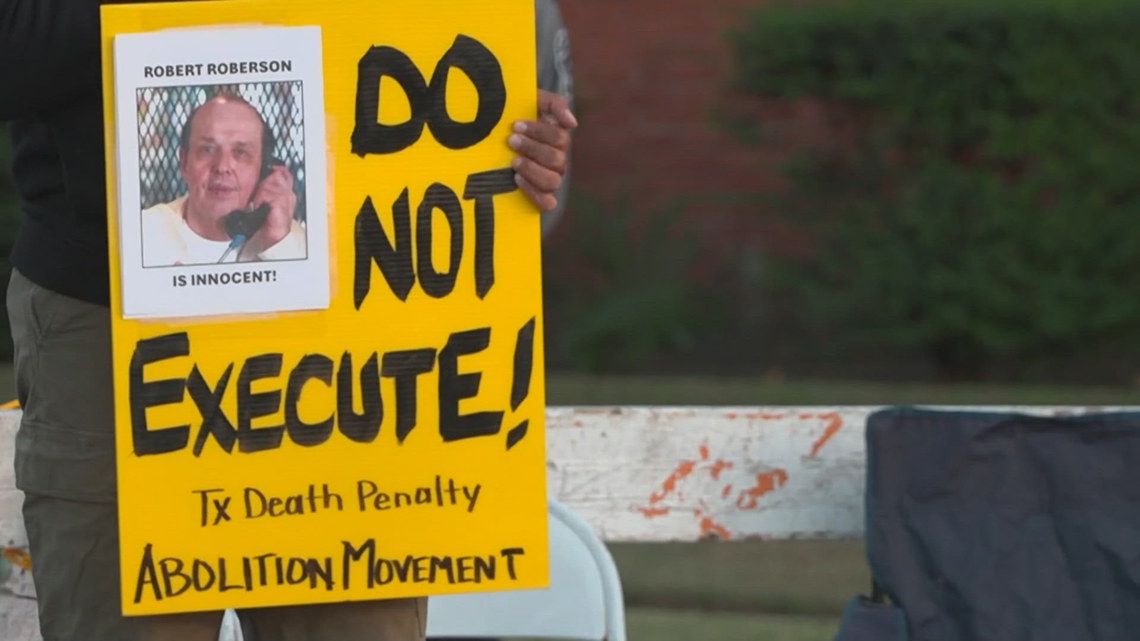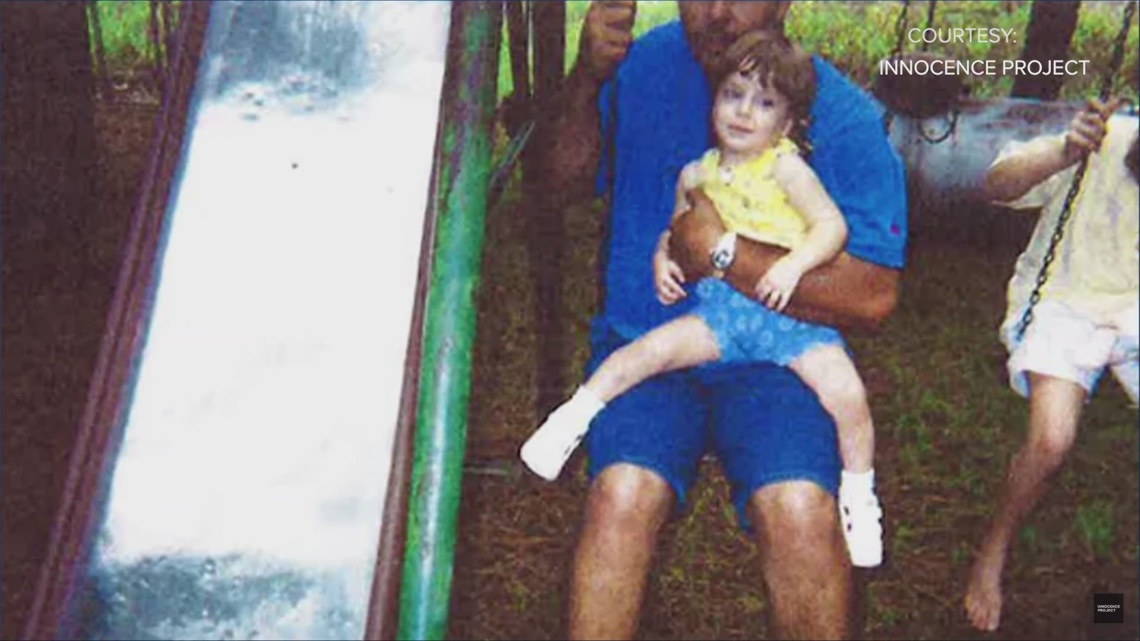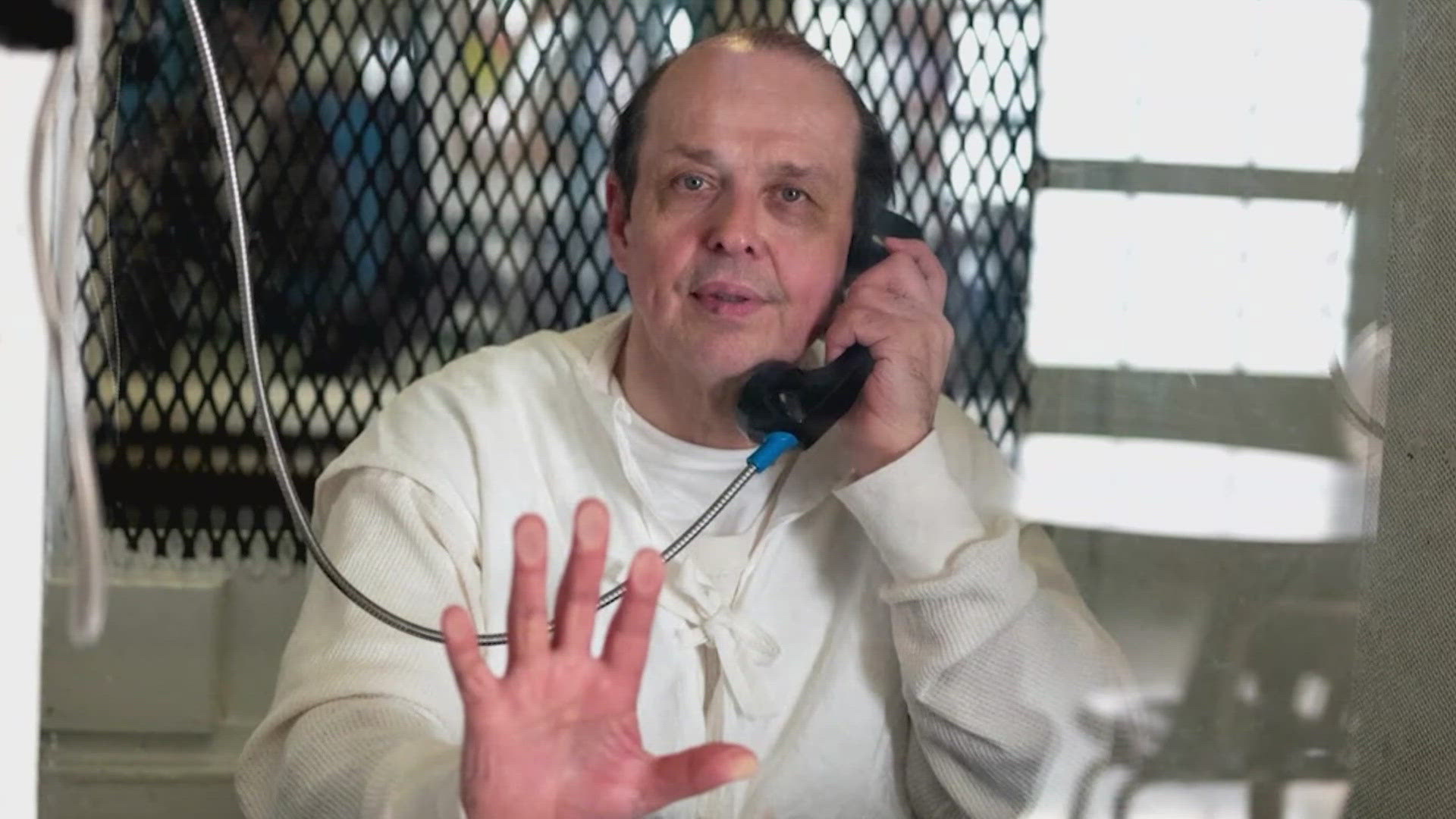AUSTIN, Texas — Late Thursday, the Texas Supreme Court issued a stay of execution for an East Texas man who has maintained his innocence for over two decades.
That order came hours after Robert Roberson was set to be executed on Thursday night amid a thundering chorus of people who believed the state was about to kill an innocent man, and who hoped last-ditch measures would buy him more time.
Robert Roberson, 57, was scheduled to die by lethal injection at 6 p.m. at the Texas State Penitentiary at Huntsville.
But under two hours before the scheduled execution, Travis County District Judge Jessica Mangrum granted a temporary restraining order on the grounds of the subpoena for Roberson that was issued by the Texas House Committee on Criminal Jurisprudence late Wednesday night.
However, hours after that, the CCA agreed with the Texas Attorney General's Office appeal and vacated Mangrum's temporary order, Texas Department of Justice spokesperson Amanda Hernandez said.
The Texas Supreme Court later issued a stay of execution late Thursday night. The highest court in Texas agreed with the state legislators who appealed that the matter at hand is civil, not criminal. The Supreme Court believes it has jurisdiction, adding there isn't a clear precedent on how to proceed.
According to the Texas Department of Criminal Justice, upon hearing of the stay of execution, Roberson was shocked, praised God and thanked his supporters. He will be transferred back to Livingston, where he has been serving his sentence.
Groups gathered in Huntsville around the Texas State Penitentiary to protest Roberson's execution Thursday night.


"We shouldn’t be killing people. My grandmother taught me two wrongs don’t make a right…I still believe that," said Robert Sarlay, who was at the penitentiary protesting with a church group. "I can’t speak for the governor, but I hope he’s listening, I hope his team is listening, it’s not too late to act, Governor Abbott, and save this life."
Gov. Greg Abbott had the authority to delay Roberson’s punishment for 30 days. Abbott has halted only one imminent execution in nearly a decade as governor and has not spoken publicly about the case.
"If he is executed today we have to question the entire criminal justice system in Texas," said State Rep. John Bucy Thursday night. "This is an innocent man, there is too much shadow of a doubt. This is an irreversible action today and it cannot happen."
The state’s legal fight to get the execution carried out had faced a midnight CDT deadline when the death warrant authorizing Roberson's execution would expire. It was likely, however, the case would need to be resolved well before that since officials must conduct procedures such as attaching intravenous needles and allowing time for an injection to take effect and a physician to pronounce him dead.
Lawyers ask Supreme Court to intervene
Roberson's attorney, Gretchen Sween, released a statement following the Supreme Court's denial of a stay of execution.
“We asked the Supreme Court to stop Texas from committing a devastating, irreparable mistake because Robert Roberson has not received due process. Yesterday, the Texas House of Representatives heard a full day of testimony documenting the failure of that process. No one who heard that testimony could be left with any doubt that Robert is completely innocent and never received a fair process.
“Highly specialized medical experts explained exactly how Robert’s chronically ill two-year-old daughter Nikki died as a result of pneumonia, exacerbated by improper medications and how the progression of her disease affected her body, along with medical intervention, to create the condition that she was in two days later when the autopsy was performed. They also explained the absence of evidence of “battery” or any other abuse and that the State’s crime theory is untethered to science. The lead detective explained how Robert’s case involved a rush to judgment based on flawed medical information and exacerbated by Robert’s autism. The district attorney could not answer the most basic questions about the facts of the case. In many ways, this hearing was the process Robert has not received from the courts.
“Over and over, the legislators made clear that the Texas courts are not applying Texas law either as written or as the legislature intended. The lawmakers have subpoenaed Robert to appear at a hearing on Monday. Yet here we are, hours away from Robert’s execution. We are asking Governor Abbott to grant a 30-day reprieve to Robert to ensure an innocent man is not executed by Texas tonight.”
Background
Roberson was convicted of killing his 2-year-old daughter, who was diagnosed with shaken baby syndrome. But experts, lawmakers, and the lead detective in the girl’s case say the science supporting Roberson’s death sentence no longer holds up — and the state’s “junk science” law should have already halted his execution.


In a stunning move, a Texas House committee voted unanimously Wednesday to subpoena Roberson ahead of his Thursday execution, a step that sought to give the man a final lifeline after a series of court rejections left him on track to become the first person in the country executed for allegedly shaking a baby to death.
That move “sets up a bit of a separation of powers issue that I think would result in him not being executed tomorrow night,” Benjamin Wolff, director of the Texas Office of Capital and Forensic Writs, said on Wednesday, adding that he had not seen this maneuver attempted before, so it was not clear what could happen. “It’s an unprecedented subpoena and an unprecedented case.”
The Texas House Criminal Jurisprudence Committee approved the subpoena hours after the state’s highest criminal court again declined to stop the execution, and after the Texas Board of Pardons and Parole denied Roberson’s request for clemency.
In a Wednesday evening filing with the high court, Craig W. Cosper, an assistant state attorney general, argues that Roberson's appeal is "unworthy of the Court's attention" and that there is no "compelling reason" to review the case.
Roberson's attorneys responded that the man was denied due process and that the state relies on "a litany of lies."
The House committee’s subpoena — which was offered by state Reps. Brian Harrison, R-Midlothian, and Leach — call for Roberson to "provide all relevant testimony and information concerning the committee's inquiry."
Gretchen Sween, Roberson's attorney, said that she had "no knowledge" of a subpoena being used before in an effort to pump the brakes on an execution.
"It shows how strongly the lawmakers who have learned about this case feel about the injustice," she said.
The subpoena could set up competing legal obligations for the Texas Department of Criminal Justice — produce Roberson for testimony at the committee’s Oct. 21 hearing or execute him Thursday.
Roberson’s attorneys and the Texas House could also use the subpoena to request a stay of execution to allow Roberson to appear for testimony before the panel. But Brian Wice, a criminal appeals attorney and former Court of Criminal Appeals clerk, said Attorney General Ken Paxton’s office, which represents the TDCJ in late-stage capital litigation, could move to quash the subpoena. That could escalate the issue up to the state’s highest criminal court.
In the Wednesday evening Supreme Court filing, Roberson's attorneys blasted the state's judicial system and attorney general's office.
"We have reached an ominous moment in terms of the sanctity of law when vast swathes of the public can be more aware of the facts of this case and moved by the injustice it represents than the state judiciary that was charged with adjudicating it," the filing states. "Likewise, it is a sad day when the State’s counsel, who have not previously participated in this case, can submit an unprincipled, baseless screed in hopes of encouraging this Court, Mr. Roberson’s last resort, to slam the door."
On Thursday, Roberson's attorneys also filed requests with the Texas Court of Criminal Appeals and a federal district court in Anderson County, requesting that the courts reconsider Roberson's case and order a stay of his execution. Roberson's attorneys note that Texas' highest criminal court earlier this month ruled that a Dallas man who was sentenced to prison in a shaken baby case deserves a new trial because "scientific knowledge has evolved." But that court again rejected the Thursday attempt to halt the execution in a 5-4 decision.
The parole board’s six members voted unanimously earlier Wednesday to deny Roberson's clemency application. The decision came amid a forceful bipartisan campaign to spare Roberson’s life, and as lawmakers raised concerns that the courts were not properly implementing a groundbreaking 2013 “junk science” law that was intended to provide justice to people convicted based on scientific evidence that has since changed or been debunked.
“It is not shocking that the criminal justice system failed Mr. Roberson so badly. What’s shocking is that, so far, the system has been unable to correct itself," Sween said in a statement after the board's vote. “We pray that Governor Abbott does everything in his power to prevent the tragic, irreversible mistake of executing an innocent man.”
Execution puts spotlight on shaken baby syndrome
Brian Wharton, the lead detective in Roberson’s case who sided with the prosecution at trial, has called for his exoneration, as has bestselling author John Grisham. A large majority of the Texas House has asked the courts to take a second look at his case. Doug Deason, a GOP megadonor and Abbott ally, also publicly said he believes in Roberson’s innocence, according to the Houston Chronicle.
“I felt like God was pushing me and telling me that I needed to get involved in this case,” Deason told the Chronicle. “Let’s not put a man to death when there are some issues and open questions.”
Roberson, who was convicted of capital murder in 2003 for the death of his ailing 2-year-old daughter, Nikki Curtis, has maintained his innocence over 20 years on death row.
“Governor Abbott, I did not do this,” Roberson said in an interview with NBC News’ Lester Holt that aired Oct. 3. “And I’m just hoping and praying that you do the right thing.”
He has argued that his conviction was based on an unfounded shaken baby syndrome diagnosis given to his daughter, which presumed abuse and did not consider her severe illness before her death. Prosecutors have maintained that Nikki suffered multiple traumas and that there was clear evidence of abuse — conclusions that Roberson’s attorneys dispute.
The four Democrats and five Republicans on the Texas House Committee on Criminal Jurisprudence urged the state’s highest criminal court on Tuesday to stay Roberson’s execution through the 2025 legislative session, saying that the junk science law “has been applied in a manner that raises serious constitutional and equitable concerns.”
“It is beyond dispute that medical evidence presented at Mr. Roberson’s trial in 2003 is inconsistent with modern scientific principles,” the lawmakers wrote to the court, requesting a stay so that the Legislature could consider amendments to the law. “We believe it would be a stain on the conscience of the State of Texas for an execution to proceed while efforts are underway to remedy deficiencies in how the law was applied to this case.”
The courts have rejected all of his appeals so far, with the state’s highest criminal court, on procedural grounds, declining on Wednesday to stop his execution. It previously denied his arguments, without considering their merits.
The refusal by the state’s highest criminal court to consider Roberson’s argument that his conviction relied on a faulty shaken baby syndrome diagnosis, lawmakers said, reflected a breakdown of due process and a failure to implement the junk science law as the Legislature intended.
“This was a pretty clear case where Robert Roberson did not have due process,” state Rep. Lacey Hull, R-Houston, said on CNN on Tuesday. “Texans deserve to know that our justice system is fair and just, and we cannot say that right now.”
The Texas House Criminal Jurisprudence Committee held a hearing spotlighting Roberson’s case and the junk science law on Wednesday as the clemency recommendation loomed. Critics have argued that in the decade since the bill became law, it has rarely provided justice as intended to wrongfully convicted individuals.
“We have one of the best junk science statutes in the nation here in Texas, and unfortunately it doesn’t seem like that was used here,” Hull said on CNN. “Under the junk science statute, Robert Roberson deserves a new trial.”
The parole board has recommended clemency in just one capital case out of the 85 applications it has considered over the past decade.
Dozens of scientists, medical professionals, parental rights groups, organizations that advocate for people with autism and faith leaders submitted letters in support of clemency along with Roberson’s application.
Letters from his friends and loved ones depicted a gentle man of faith who remembered people’s favorite colors and sent handmade birthday cards to everyone he met.
“This man would never harm another person, especially not his small little baby girl!” Manuela Doris Roberson, whom Roberson married in 2022, wrote in one letter. “Robert’s life is worth more to me, his children, his friends and loved ones than all the treasures of this world.”
Pooja Salhotra with the Texas Tribune contributed to this report.

